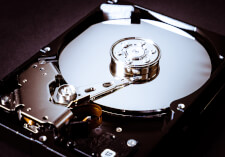Hard Drive
A hard drive (sometimes called a "hard disk drive") is a type of non-volatile data storage device. Hard drives are one of the most common forms of data storage, along with solid-state drives (SSDs). They are often mounted inside a computer and connected directly to the motherboard, although external hard drives in separate enclosures are common backup storage devices. Solid-state drives have replaced hard drives as the primary storage device in most computers, but hard drives are still commonly used as secondary storage.
Hard drives store binary data magnetically on several spinning platters inside the drive. Each platter has a magnetic coating that can hold billions of positive and negative magnetic charges. Each separate magnetic charge represents a single bit, either 1 or 0. As the platters spin (typically at either 5,400 or 7,200 revolutions per minute), a small actuator arm moves across the platters reading and writing these magnetic charges. The platters retain these charges even when the drive is disconnected from its power source, keeping the data intact.
When compared to solid-state drives, hard drives have some technical drawbacks. First, because they have moving parts, hard drives may mechanically fail if the platters or actuator arm are damaged. They also read and write data much slower than SSDs. However, hard drives are available at much higher capacities — 10 terabytes or more, as of 2023 — at a much lower cost-per-terabyte than SSDs, so they are still useful in situations where total disk space is more important than speed.
 Test Your Knowledge
Test Your Knowledge